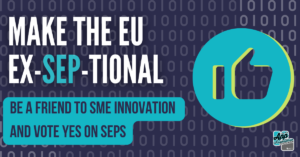
Recently, the Legal Affairs Committee of the European Parliament took a significant step forward in advancing the much-needed standard-essential patent (SEP) regulation in the European Union that would curb SEP licensing practices that continue to harm and distort competition across consumer and enterprise markets. This development is important to the ACT | The App Association’s small and medium-sized enterprise (SME) members because they so often seek to build on standardized technologies as they create new IoT innovations, yet are excluded because they cannot get fair, reasonable, and non-discriminatory (FRAND) licenses for the SEPs in those standards. We believe it is crucial that MEPs vote yes on the EU’s SEP regulation to support SME growth and, ultimately, promote consumer choice and sustainable tech development.
Keep reading for our history of work on this issue, why SEPs are important to SME innovation and growth, and how the EU Parliament can and should act swiftly to foster a level playing field.
SEPs and SME innovation
Technology standards are the linchpins of innovation, providing a baseline for interoperability between products (even competing ones) – think WiFi, 4G, and 5G. As those standards are developed, they sometimes incorporate patented technologies that cannot be used without licenses, making these patents “essential” to the use of the standard. This grants SEP holders significant power over who can utilize the standard. Additionally, they bear the responsibility to uphold their promise of providing FRAND licenses to all who seek to use the standard. Regrettably, this power has not always been wielded consistently with the voluntary promises made by SEP holders, to the detriment of the broader interests of the innovation ecosystem, most harming SMEs which lack the resources and experience that large multinational corporations just as they are trying to compete in critical internet of things (IoT) markets.
Fostering an environment where SMEs can compete on equal footing and innovation is not stifled by opaque and unfair SEP licensing practices is of critical importance to the EU’s competitiveness and global standing. While there is room for improvement, the proposed SEP Regulation would take vital steps in the right direction, aiming to balance the compensation for SEP holders and the interests of SMEs and, by extension, the broader consumer base by promoting choice and sustainable technological development.
‘You get a letter with an offer, and you have no idea if that offer is good or bad, so you just have to take it, or you are risking basically an injunction which could put your company out of business because you just don’t have the resources to be at court for several months. It’s as simple as that. The small and medium companies just don’t have the bandwidth to accommodate injunctions, especially if it happens in multiple markets’. – Tomas Navratil, LucidCircus
Our members at work
To address the existing power imbalances and transparency issues within SEP licensing markets, the App Association has engaged with the European Commission and EU Parliament for years to ensure that the SME viewpoint is fully considered in new SEP policies that will make, or break, the EU’s economic and competitive fabric. Some recent examples include:
Green agenda and SME-friendly ecosystem: Real solutions in sustainable tech rely on the pivoting power of SME innovation to create IoT devices, like smart sensors and carbon footprint trackers, that are necessary to achieve energy efficiency. Click here to learn more about our members’ support for an SME-friendly ecosystem to enable a greener future.
Fairness and transparency for SMEs: Recent court cases, academic studies, and SME surveys in the EU and UK have proven that small businesses are being directly harmed by the status quo. Learn more by reading our member letter to the European Parliament to ensure fairness and transparency in tech licensing for SMEs.
Restricting monopoly abuse through FRAND: Responsible SEP regulation helps restrict abuse of the inherent monopoly position of a SEP holder, which has been wielded against innovators seeking to leverage standards. Meaningful FRAND licensing to all is a condition precedent for accessible and competitive IoT markets. Learn more about our FRAND events and efforts here.
‘SEP licensors also use other strategies in order to gain more leverage in licensing negotiations, such as filing for or threatening the use of injunctions. Some large SEP holders regularly refuse to license to certain businesses altogether, which goes against the non-discriminatory requirement in the FRAND terms’. – Future of SEP Regulation Roundtable, Brussels, Belgium
Moving forward
The advancement of the proposed SEP Regulation represents a critical step in our collective journey toward an environment where constantly improved product features at lower costs are the norm, but the regulation’s advancement out of the JURI Committee is not the end of the process. We urge all stakeholders to lend their support to the Regulation on 26 February, when an EU Parliament Plenary vote is set to take place. With your support, we can ensure that the EU once again becomes a place where SMEs can contribute to the technological advancements that drive our society forward.
If you would like to be involved in our EU SEP activism, please reach out to our global membership manager, Brad Simonich ([email protected]).